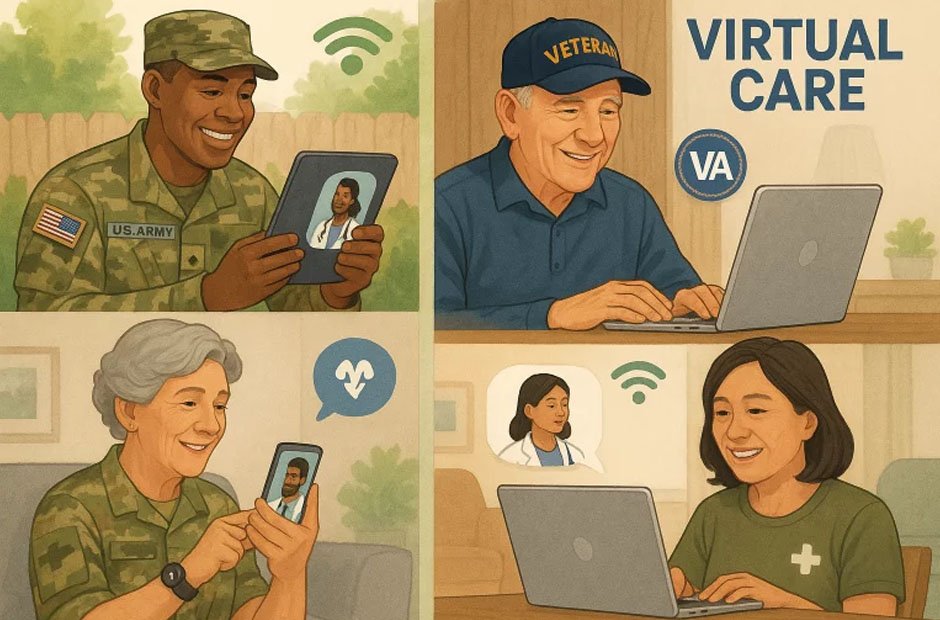Virtual care is revolutionizing the healthcare experience for veterans, offering improved access to vital medical and mental health services. The Department of Veterans Affairs (VA) is integrating advanced technologies, expanding emergency telehealth options, and exploring innovative therapies, such as virtual reality, to provide compassionate, high-quality care. These advances are particularly beneficial for veterans in rural or underserved areas, as they bridge gaps in care and empower them to manage treatment and claim documentation from the comfort of their own homes. The rapid growth of virtual care tools and resources is transformative, making informed health choices and accessing VA benefits easier than ever. By understanding how these services are implemented, veterans can fully leverage the benefits of modern care solutions in today’s digital world. Every step towards a more seamless virtual care environment ensures every veteran receives care tailored to their needs, regardless of location or circumstance.
Expansion of Tele-Emergency Care
The VA launched tele-emergency care (tele-EC) nationwide in September 2024, a significant step toward improving emergency care for veterans. The service connects veterans to clinical triage nurses and specialized providers, allowing urgent medical concerns to be assessed and resolved without in-person visits. Over 61,000 veterans have already used this service, with nearly 60% of cases managed virtually. In addition, the initiative provides VA disability claim help with medical evidence to ensure that veterans receive the necessary support for their claims while navigating the complexities of healthcare. Programs like VA Health Connect guide veterans to the right level of care, reducing unnecessary visits and travel burdens. This initiative is particularly beneficial for those who are far from VA facilities or have mobility challenges.
Virtual Health Resource Centers
The VA’s Virtual Health Resource Centers (VHRCs) are assisting veterans and their families in digital healthcare. They are located at major medical campuses, like the Minneapolis VA Medical Center, and provide individualized education, troubleshooting, and one-on-one sessions. These centers enable veterans to book virtual appointments, manage their medical records, and communicate with providers from the comfort of their own homes. As VA services transition to hybrid or virtual models, veterans’ digital confidence decreases, which can lead to improved overall health and increased peace of mind.
Telehealth in Rural Communities
The VA has invested in telehealth technology to provide world-class medical care to approximately 4.4 million rural veterans in the United States. In fiscal year 2023, over 770,000 veterans accessed nearly 3 million telehealth visits, demonstrating the growing trust and utility of these digital health solutions. VA Video Connect enables veterans to participate in routine exams, receive urgent advice, obtain specialist referrals, and engage in group therapy from the comfort of their own homes. Telehealth reduces travel, expenses, and treatment delays, making geography no longer a barrier to the highest standard of care.

Virtual Reality in Therapy
Telemedicine is incorporating virtual reality (VR) into its healthcare services, allowing over 200 veterans to experience tailored environments for various health concerns. VR interventions include natural scenes, guided meditation sessions, and dynamic rehabilitation exercises. This immersive approach allows veterans to actively participate in their healing, particularly for chronic pain, PTSD, and mobility challenges. The VA’s commitment to innovation demonstrates its dedication to maximizing recovery and improving quality of life. By combining technology with compassionate, evidence-based care, VR is helping veterans regain comfort and hope during their healing journey.
Partnerships to Bridge the Digital Divide
While virtual care has vast potential, its success relies on equitable access to digital infrastructure—something not all veterans currently enjoy. Reliable internet and updated devices are essential prerequisites for remote care, yet many rural or economically disadvantaged veterans lack access to these resources. Recognizing this, the VA has forged impactful partnerships with technology giants like Verizon, working together to expand broadband coverage through advanced cellular and satellite technologies. These collaborations are effectively narrowing the digital divide by bringing high-speed internet to places where it was previously unavailable or unaffordable. The result is broader access to telehealth appointments, group counseling, remote monitoring, and essential claims support—empowering every veteran to enjoy the same quality of care, regardless of location or financial status. These public-private efforts are crucial to ensure that innovative virtual care does not leave anyone behind. As connectivity improves, the reach and effectiveness of VA services will only continue to grow.
Impact on Mental Health
Digital solutions have proven particularly profound in supporting veterans’ mental health, a field where access, privacy, and timeliness are critical. Veterans continue to face alarming rates of depression, PTSD, and suicide risk, often compounded by the stigma of seeking help or logistical barriers to in-person care. A pivotal study published in JAMA Network Open confirmed that even a modest 1% increase in virtual mental health visits led to a remarkable 2.5% reduction in suicide-related events, emphasizing just how powerful and potentially life-saving easy access can be. Telehealth not only brings routine and crisis interventions into the comfort and privacy of a veteran’s home but also supports family involvement in care, flexible scheduling, and discreet help when it’s needed most. Veterans report feeling better supported and more likely to stay engaged in therapy when obstacles like travel, waitlists, and stigma are minimized. This evolution in mental health care means that more veterans can receive timely, personalized, and effective support, regardless of their location.



